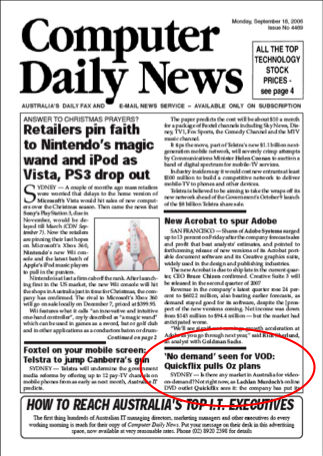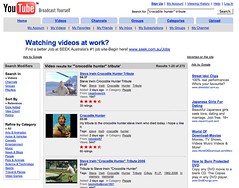"Want me to push the envelope, toe the line, or push the envelope along the line with my toe?"
I said that to someone this afternoon without really thinking about it, and it's a funny mental image. Not hilarious, but amusing.
Friday, September 29
Pushing the envelope along the line
Wednesday, September 27
Is MySpace missing the biggest opportunity?
Tuesday, September 26
Declining Blockbuster now a target for comedy
The decline of the once-dominant US video rental chain, Blockbuster, is now so obvious to the general public that it's the subject of gags such as this item in The Onion, where a struggling Blockbuster eliminates rental fees entirely and lets customers help themselves to whatever they want in the store - even the candy bar.
The company which once enjoyed total domination over a multi-billion dollar video rental industry, with stores as far afield as here in Australia, has been completely transformed in less than ten years by the advent of online media, led by the new giant in video entertainment, Netflix.
How desperate has Blockbuster become to survive against the combined pressures of on-demand movie content delivered by digital cable and Netflix? The Onion piece says it all:
"Please, we’re just asking for one more chance," added (vice president of marketing) Waters as she dropped to her knees and extended her arms out to the assembled crowd.When the zeitgeist says you're dying, how to you save your business? You really can't - all you can do is delay the inevitable for as long as possible, or try as rapidly as you can to transform your business into something else. Blockbuster has been doing both - giving massive discounts to customers still prepared to walk into their stores and rent a DVD - and putting so much behind the company's DVD-by-mail service that it is now the official Blockbuster website, not just a button off the home page.
Too little, too late, unfortunately. Blockbuster had more market intelligence than anyone in the early 90s and should have known that when DVD replaced VHS it would change the rental business forever. It should have seen that, with a lower risk of piracy, more robust construction and smaller size, it would be possible to get DVDs to customers in innovative ways - like in the mail. It should have seen digital on-demand delivery coming and invested in it heavily, since in the US, postal delivery is only a stop gap - the US has the broadband infrastructure and high-density population to comfortably deliver on-demand content now, a decade after this trend should have been apparent.
And when the little plucky web startup which was Netflix didn't go 'pfffft' along with the likes of other online/home delivery startups like WebVan and petstore.com, Blockbuster should have acquired Netflix as early as possible, for whatever it cost. By the time Blockbuster decided on a strategy - to compete rather than acquire - Netflix had five years of almost no competition from an established market player. It had five years of customer relationships, rental history, and smart guerilla marketing.
By the time the sleeping giant woke up and launched its own hybrid in-store/mail service, it was already too late for Blockbuster. Netflix had the zeitgeist behind it, and now the zeitgeist generally agrees that Blockbuster can't compete, and that it will go out of business. You can't beat popular opinion.
Saturday, September 23
Zookoda for sale, business as usual
A few Techcrunch readers may have been unduly harsh about why the founders of Zookoda have decided to sell their business. Critics should stop for a moment to consider whether they're really asking too much to sign up for free to a web startup and have that service continue unchanged and without growing pains. You want every email responded to in <24hrs and no service interruptions? Pay IBM a lot of money for something bespoke, don't sign up with a free web startup!
Why are the Zookoda guys selling? Well, no experienced startup founder starts a new business with the expectation that they'll continue to operate the business 'for the term of their natural life'. Even offline businesses (you know, 'real' businesses, like restaurants, law firms, real estate agents) get bought and sold. Web startups aren't the only companies to get built and sold in a few months either - many software and technology businesses are bought and sold even quicker - subscribe to a genomics or mobile software news RSS feed for a week. In my own experience, I've founded and sold one business in 11 months, and even bought one business and then sold it back to the founders in a year, at a profit. Neither of them were web startups.
I'm no business coach, but I've done startups, and I think any startup founder should always have three options in their mind at all times in order to maximise the value of their investment of time and intellectual capital:
- Should I acquire another business?
- Should I restructure my business?
- Should I sell my business?
There are plenty of reasons to try and sell a successful business, including changes in personal circumstances, relationship issues between founders, and a lot of sound business practice - your startup may get a turbo boost by being added to a set of products onsold by the purchaser's sales team, or plugged into a suite of products that already sells well, or taken to the next level by the purchaser's experienced development teams. Reading between the lines, I think the Zookoda founders are hoping to find someone who can turbo-boost the business by plugging them into a small business sales team, a broader small business software suite, or a successful advertising sales network.
Choosing to sell at auction isn't always a sign of a fire sale, either. Economists will tell you that auctions are the best way to efficiently value an asset, and auctions are used to reach a broader range of buyers than can be found through your own business network. It makes sense that a few guys working as hard as they can to keep a service growing might not have the broadest network of contacts to find potential buyers for a fairly niche business.
Like any startup, Zookoda's had growing pains, and anybody who's experienced some of the customer service issues mentioned by Techcrunch readers should stop and consider how you'd fare if you were part of a tiny startup team trying to provide responsive service and support 24x7 worldwide for a business that's gone from zero to thousands of customers since it launched in March. Alexa ranks them in the top 1% of URLs worldwide and recently their pageview growth is way off the chart, very interesting if you compare it to a similar service like FeedBlitz.
I use Zookoda for my own blog email feeds and I've experienced problems, but with patience and communication they've been resolved, and it's never seemed to me that the guys at Zookoda were doing anything other than working very long hours trying to make the service better for me and other customers. I'd like to continue to use Zookoda once its in new hands, and I'd be prepared to pay a reasonable monthly subscription or include AdWords-style text ads in my feeds in order to do that.
I hope it pans out well for Zookoda and I'm grateful that I got to use such a cool service for so long, for free.
Technorati Tags: zookoda, techcrunch, web 2.0
Wednesday, September 20
Quickflix talks sense on Aussie movie downloads
After too long listening to people hyping up online movie downloads in Australia as if high-definition on-demand first-release movies-to-your-living-room were just around the corner, it was a refreshing surprise to read Stephen Langsford from Quickflix, who was quoted saying something much more sensible and realistic in industry email newsletter, Computer Daily News (CDN.)
To protect its subscriptions (its sole revenue source) CDN is only available via email, and only via paid subscription, so as much as I'd like to, I can't point you to a URL, but here's how Stephen was quoted in the article:
Pre-Murdoch, Quickflix said it would launch a download and streaming offering in "the coming months". However, CEO Stephen Langsford now says it won't launch movie downloads until it's sure of demand and service quality. He says the lack of content coming from film studios, slow broadband speeds and low consumer acceptance will slow take-up of video-on-demand for at least the next five years.
That's the most sense I've heard from anybody else in a long time, and admirable candour from the founder of Australia's only alternative to the appallingly bad Telstra BigPond Movies. I'd say five years is about right, and in the meantime, broader content choices, low cost and being able to watch them on your living room plasma screen makes offline DVD rental a way better proposition than online movie downloads.
Disclaimer: I own shares in Quickflix.
Tuesday, September 19
Google likely to partner with Apple on video?
Google's Eric Schmidt is an Apple board member, Apple is one of the few tech companies Google doesn't directly compete with for customers, and Google searches and indexes a whole lot of video content on the web.
According to ZDNet, that's enough to lend credence to speculation that Google-indexed streaming video content might be featured on Apple's pre-announced iTV product. 
I don't think that's very likely to happen. Partly because Google and Apple are polar opposites when it comes to the importance of design. Say what you like about Google engineers, but they don't design attractive products. As an example, consider how Apple's logo has evolved from the same cheezy rainbow colour scheme as Google's into a thing of rarefied beauty, while Google's has remained a cheezy rainbow of clumsy typesetting. Consider how if Google updated their logo, it would cause outrage amongst Google's most loyal users. Consider the iTV interface showcased by Steve Jobs, versus the horrid default font nightmare which is Google Video. Enough said.
Consider your evening spent in front of the large plasma or LCD in your living room. You've laid out quite a bit of money for a surround sound system, comfy chair, big-screen TV. Now choose between a downloaded TV show from iTunes in high-resolution format, professionally produced, highly-rated by expert critics, running for about 30 minutes, or a series of 60 second home video clips indexed by Google Video, in glorious 480x320 (each pixel a foot high on your big TV screen), with low-fidelity sound, produced by amateurs, selected for you by the high school students of the world. As if you want to spend that much time with your finger on the remote control!
If that weren't enough of a hurdle for Eric and Steve to get together on this, imagine Jobs explaining to the TV and movie studios that if they agree to licence their content to iTunes, their biggest competitor will be the vast, free video indexes of Google Video.
Are TV studio execs likely to want the competition? Will they be comfortable seeing their precious content brands cheek-by-jowl with home-produced spoofs of their own expensive productions? Will they be able to keep it all in perspective?
If they can, it will be for the first time!
Technorati Tags: iTV apple google video streaming DVD
Friday, September 15
Zune comes in brown!
I know this is trivial, I apologise in advance, but I can't believe the new Microsoft Zune portable player is going to ship in brown as well as the 'default player colours' of white and black. Don't get me wrong - I'm big on brown, I wear a lot of brown, and I think brown is, has, and always will be the new black.
But brown in a portable player? Brown in any consumer electronic product? Brown in any hard ABS plastic or metal finish? And such a pale, pappy, sappy brown? That's wrong... all wrong... won't go down anywhere outside of Washington State, and possibly not even beyond the Microsoft campus.
What they used to put in the Koolaid must now be now added to the frappucinos in Redmond (which are about the same colour).
Photos: Microsoft presses play on Zune | CNET News.com
technorati tags:brown, zune, microsoft
Blogged with Flock
Tuesday, September 12
Amazon's unbox video download service puts it all into perspective
Those predicting that digital movie downloads could be a commercial success in Australia would do well to observe the difficult birth of Amazon unbox, the first offering in this area from the world's most experienced online retailer, Amazon.
Saying it's an uninspiring offering in its first iteration is an understatement. The proprietary unbox application is a clumsy bit of client software that only runs on Windows, installs a bunch of cruft you may not want, and has a few critical privacy issues. Mike Hoefflinger reports (while trying to install it on an Xbox 360 but it's still a Windows Media Center installation) that the installation process was "craptacular"!
It won't work for Apple owners, downloaded videos won't play on a video iPod, and some eary users report having trouble even getting a download to finish in less than 24 hours. This in the Land Of High-Bandwidth Access? How's that going to play in the no-fibre-to-the-node network we limp along with in Australia? Let's not forget that Australian ISPs like to cap your monthly bandwidth, or charge you more if you download too much. At about 1.5GB per movie, download cost would be a factor if you started using unbox frequently in Australia.
Just to complificate things a little more, although you can keep the content on your PC for up to 30 days, once you start viewing it, you have only 24 hours to finish it. Tough luck if you were hoping to watch a bit of it today and the rest later in the week.
If you happen to own a non-Apple portable player (unlikely, but some people apparently do) you'll have to download an additional mobile version of your content to play it on that device.
All of that is important, but the number one problem is more fundamental still: the DRM encoding prevents you from burning the download to DVD so you can watch it in the living room with your 2-3 year old 'legacy' home entertainment system. No, you've got to leave it on the PC in the study, and watch it on a screen so small that the analogue TV exceeded those dimensions in the late 1960s. Good luck convincing the family to watch it in the study with you!
None of these problems are unsolveable for the Australian market, but many of them are intractable, to say the least. Securing a broad and deep content library that doesn't have unreasonable DRM barriers requires considerable leverage in negotiations with Hollywood studios that most Australian companies don't enjoy (just look at the challenges Australian TV networks have negotiating for free-to-air rights.)
Developing a technical solution that works on a broad range of popular devices both in the living room and the computer room requires world-class software development experience and significant testing and support resources.
The lack of high speed bandwidth to the home and the high cost per gigabyte of data over existing networks is a problem, whether you're Telstra (which must forego profit to offer free content downloads) or another ISP (which must pay Telstra for the data and then pass that on to you.)
None of it's insoluble, so it'll all be resolved at some point in the future. Maybe if we pay attention to the hard lessons Amazon's learning on the bleeding edge, the Australian offerings may be better than unbox when they launch.
Disclaimer: I hold shares in www.quickflix.com.au
Technorati Tags: unbox, amazon, video
Friday, September 8
AppleInsider: Apple iPhone really, truly coming this time
I'm grateful to AppleInsider for brightening up my day in Grim City for meetings by once again reporting analyst predictions that an Apple iPhone is once again just around the corner, no really, truly, honestly this time... sorta.
This time it's Shaw Wu, analyst from American Technology Research, who's the analyst keen enough to drum up some hype to be quoted in a story. To be fair, Google says this isn't the first time Wu has commented on this area of the business, though his usual beat seems to be portable music players.
Really, the only missing piece of the puzzle is any actual evidence that Apple is soon to announce a product. No filing with the FCC for regulatory approval, no credible leaks from component manufacturers or carriers, no evidence of any marketing plans, no word from major retailers, and of course, no news from Apple itself.
Don't get me wrong, I'll buy the first Apple iPhone I see. I'll even get a friend to FedEx me one from the US and put up with inevitable localisation issues (because if Apple goes the MVNO route it'll be the year 3000 before they get around to doing it in little markets like Australia. They still don't offer book and photo printing for iPhoto.)
But in the meantime, my K800i is a kick-arse little beauty that puts Nokia's N-series and the LG Chocolate look like lame executoys and expensive lipstick holders, respectively. With Apple's iSync synchronising my all my contacts, to-dos and calendars beautifully with the K800i via bBluetooth, I really can't imagine how an iPhone could be better... other than offering a white version...
Technorati Tags: apple, iphone, appleinsider, cellphone, mobile
Thursday, September 7
The flying car is coming! Duck!
Terrafugia are taking deposits on their flying car, the Transition, even though a prototype isn't due until 2008 (and prototypes aaaalways run late.) In the meantime, you're able to watch some lovely animations of the thing landing at a runway and driving home, read the planned specifications, and download a flyable demo using the X-Plane software simulator.
Terrafugia prefers to call it a "roadable car" because you're meant to only drive it to the airport and back - saving on hanger rental by parking it in your garage at home. It is about 2m tall with wings folded, only takes 2 people and requires a built-in calculator to help balance passengers and luggage when airborne, so I can't see it making much of a useful every-day car anyway.
Even from the animations I can foresee some significant engineering challenges that presumably are still works-in-progress, including a set of folding wings. Whatever the mechanism, you definitely want those puppies to work perfectly every time! You won't enjoy your landing if they fold mid-flight, and you won't get very far on the road with your wings still extended to their 8m span!
Minimum runway length is listed as 500 meters. Hmmm... of course, it would be highly illegal, not to mention incredibly dangerous, to skip the airport and use the nearest straight stretch of quiet freeway... you'd need at least two empty lanes... but I wonder if they could scramble the police helicopter quickly enough to catch me...
croc hunter has 275 tribute videos on YouTube!
It had to be said: MYOB is a worst-case in software design

Nat over at Decisive Flow has broken the silence at last; MYOB (Mind Your Own Business) is easily the worst example of design in a popular software product available in Australia. It had to be said, and I'm sure I'm one of millions of small business owners who mutters several expletives every time they launch the product.
MYOB doesn't let me 'mind' my own business at all, it actually makes me shy away from the financial management of my business. There's nothing I hate doing more than using MYOB - I'd willingly stand in a customer service queue at the Department of Small Business for three hours rather than spend an hour using MYOB - and I'd almost certainly be more satisfied with what I'd achieved in that time!
Unfortunately there's little to no incentive for MYOB to improve their product. Only one competitor in the small business accounting software market, QuickBooks, and - incredible but true - it's actually harder to use and as marginally functional as MYOB. And accounting software is one of the few market segments in the software industry to remain local and parochial - you can't develop a new accounting software package in Australia and then easily export it overseas. Accounting and tax practices vary so much from country to country that localisation costs are huge. Even the big, hairy gorilla, Microsoft, has half-implemented a poor localisation of Microsoft Money for the Australian market, presumably because the costs of doing it properly are too great for such a small market.
Finally, MYOB must earn significant revenue from selling hard-to-use software - many MYOB owners I know have reluctantly signed up for one of MYOB's expensive premium telephone support subscriptions. Two MYOB owners I know have learned enough about the product over sufficient time that they've started clawing back that investment by offering their services trouble-shooting other friend's MYOB problems on an hourly rate.
Even though my own business is tiny, I've taken to using a book keeper once a month to do it all for me - she's my firewall between my business and MYOB. It means I never have to launch MYOB again. But there it sits on my hard disk anyway - a 107Mb fat lump of lard - so that my book keeper can send me the updated data file every month. If she gets hit by a bus I need to have it on file to take to the next book keeper. I don't even get to forget that I own the software, because every month I get some junk mail in my PO Box from MYOB, reminding me to pay an exorbitant fee to upgrade the software, or induce me to cross-grade to a related product, or even invite me to pay through the nose to attend further training courses. All this while it's such a bad product I pay someone else to use it for me.
Technorati Tags: MYOB, bad software, accounting
Technorati Tags: MYOB, bad software, accounting
Technorati Tags: MYOB, bad software, accounting
Tuesday, September 5
How'd you like to "invest" in a horse race?
I was walking past a TAB betting outlet in Sydney the other day, happened to glance at the big, bright posters in the window explaining how to put money on a horse, and couldn't believe my eyes: the posters all referred to the act of risking your hard-earned on a flea-bitten nag as an "investment"!
I took a photo with my cameraphone but unfortunately the flash flare obscures the relevant words in the picture. So I looked up the TAB's online FAQs, and sure enough, they refer to it as an "investment" too.
One man's "gambling" is one man's "investment". I guess it's marginally defensible as an "investment" as there's a chance it might pay a dividend, and I guess there are also highly speculative investments to be made in more sober markets such as stock exchanges and auctions. But still, the marketing team at TAB must have stayed up all night to hit upon that alternative to the word "gamble", and then gone out for a few beers to celebrate when they settled on "investment." Don't know how many drinks they had, but I bet they refrained from "investing" any money on a horse on the way home!






